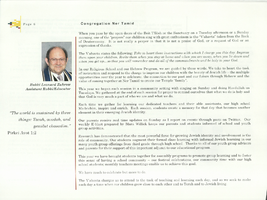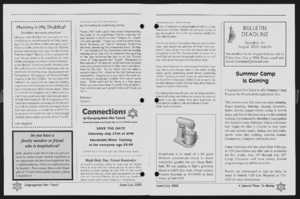Search the Special Collections and Archives Portal
Search Results

Annual report from Congregation Ner Tamid, 2010-2011
Date
Archival Collection
Description
Annual report from Congregation Ner Tamid, 2010-2011
Text
Chris Erbe oral history interview
Identifier
Abstract
Oral history interview with Chris Erbe conducted by Jennifer Warner on November 15, 2001 for the Public School Principalship Oral History Project. In this interview, Erbe reflects upon his more than 20-year career as a teacher and administrator with Nevada’s Clark County School District (CCSD). He discusses the process by which he became a teacher, and describes how his experiences as a teacher shaped his approach to school administration. He describes his regular responsibilities as principal, some of his biggest challenges including safety threats, and what he believes makes an effective administrator.
Archival Collection

Anita Tijerina Revilla oral history interview: transcript
Date
Archival Collection
Description
Oral history interview with Anita Tijerina Revilla conducted by Marcela Rodriguez-Campo on October 09, 2018 for the Latinx Voices of Southern Nevada Oral History Project. In this interview, Revilla discusses her early life in San Antonio, Texas. She talks about her decision to make education a priority, figuring out the college application process on her own, and her initial interest in social justice. Revilla talks about how her critical consciousness was developed, and her pedagogical approach to teaching. Revilla describes her role in the 2006 May Day march, advocating advocating for the queer community, and disrupting oppressive systems to increase educational access for students. Lastly, Revilla discusses ethnic studies and the history of inequality in the United States.
Text

Transcript of interview with Liliam Lujan Hickey by Claytee D. White, September 7, 2018
Date
Archival Collection
Description
Liliam Lujan Hickey was born in 1932 Havana, Cuba, where her father owned an insurance company and her mother was a music teacher. At age 17, Liliam married Enrique Lujan who owned five casinos and who was twelve years her senior. It was the early 1950s, and the people of Cuba lived with stark distinctions between upper class and low-income families. Liliam and Enrique lived a life of luxury. She became accustomed to flying to New York for dinner and wearing the finest Italian silks for custom dresses. Then in 1959, Liliam’s life took a vast turn as Fidel Castro rose to power and seized assets from the wealthy class. This upended Liliam’s family and in 1962, Liliam, Enrique and their three children fled to the United States. They first arrived in San Diego, California, where Liliam took a job at the Scripps Clinic. While Liliam spoke five different languages, she attended night school to learn English. Eventually, Liliam and her family moved to Las Vegas where Enrique could find work in the casinos. Unexpectedly in 1972, Enrique passed away, leaving Liliam and her children to fend for themselves. Liliam was thrust into the role of matriarch; she learned how to write a check and drive a car. She describes this as a period when her community activism awoke, how she secured a position working for the Nevada Welfare Administration Office, and how her persistent spirit led her to citizenship within a week. Through friends, Liliam met Nevada legislator Thomas Hickey, an Irish American who she endearingly nicknamed her Pink Husband. Liliam credits Senator Hickey with teaching her about life and the world, and ultimately inspiring much of her political activism. She was an active member of the Latin Chamber of Commerce, first known as el Circulo Cubano. At the peak of her career, Liliam became the first Latina to be elected to the Nevada State Board of Education. She envisioned building a village through schools in order to support and help all students be successful. A local Las Vegas school, Liliam Lujan Hickey Elementary School, was named in honor of her public service. Today, Liliam is retired, but continues to work to increase civic engagement in the Latinx community and improve our educational system.
Text






